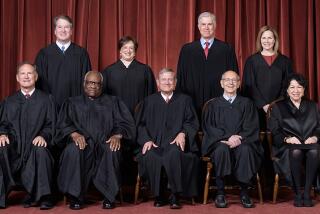High Court to Hear L.A. Test Case of Racketeering Law : Appeals: Issue is whether drug runner’s investment in gold mine falls under RICO statute. Lower court said no; Justice Department says yes.
- Share via
WASHINGTON — The Supreme Court said Monday that it will consider the case of a Los Angeles lawyer who drove off with his client’s Cadillac and $980,000 in drug cash, which he eventually used--literally--to open a gold mine.
A decorated Vietnam veteran and an honors graduate of Georgetown University Law School, Juan Paul Robertson worked as a federal prosecutor in Los Angeles during the late 1970s.
“Here is a person who, for the first 36 years of his life, did everything right,” a federal judge said of Robertson.
But after leaving the government in 1980, he set up shop as a criminal defense lawyer in Southern California--and soon found himself in close contact with cocaine and the bags of cash it produced. In 1991, he was indicted on eight counts of dealing cocaine and running a criminal enterprise.
Convicted on most counts, he was sentenced to 20 years in prison.
On Monday, the high court announced that it would hear Robertson’s case, not to examine a lawyer gone bad, but to clarify the reach of the federal anti-racketeering law.
In February, the U.S. 9th Circuit Court of Appeals upheld Robertson’s conviction on the drug charges, but it threw out his racketeering conviction on the theory that his gold mine in Alaska was an “entirely local operation.” Because the federal racketeering law applies only to an “enterprise which is engaged in interstate commerce,” it does not apply to criminals who funnel their money into strictly local businesses, the appeals court said.
If allowed to stand, this ruling could dramatically weaken the anti-racketeering law, Justice Department lawyers said in their appeal, and allow organized crime figures to infiltrate small businesses with impunity.
For his part, Robertson appeared to have been a one-man organized crime wave during the mid-1980s.
In 1983, Juli Silva-Lopera was arrested on a drug charge, and he asked attorney Robertson to put in storage the Cadillac parked near his Reseda home. It contained two kilograms of cocaine and $980,000 in cash.
Rather than keep it for his client, Robertson drove the car to Phoenix and had his estranged wife put the money in a bank deposit box.
Later, Robertson was accused of doing the same with other clients by either taking bags of cash or large amounts of cocaine. He paid $270,000 in cash for a home in Phoenix and made other large purchases totaling $700,000. He also spent $250,000 to buy a gold mine in Alaska. Silva’s Cadillac was sent to Fairbanks for use by the Robertson Mining Co.
In 1970, Congress passed the Racketeer Influenced and Corrupt Organizations Act, commonly called RICO, to give prosecutors a weapon against organized crime bosses who invest their illegal cash in legitimate businesses.
If convicted under the law, mobsters can get long prison terms and the government can confiscate all their assets.
In February, the justices will hear arguments in the Robertson case and rule by July on whether a business such as Robertson’s gold mine can be the basis for a RICO violation.
But the outcome will not necessarily change Robertson’s prison term. His 20-year sentence could be justified for the drug charges alone, prosecutors said.
More to Read
Sign up for Essential California
The most important California stories and recommendations in your inbox every morning.
You may occasionally receive promotional content from the Los Angeles Times.














